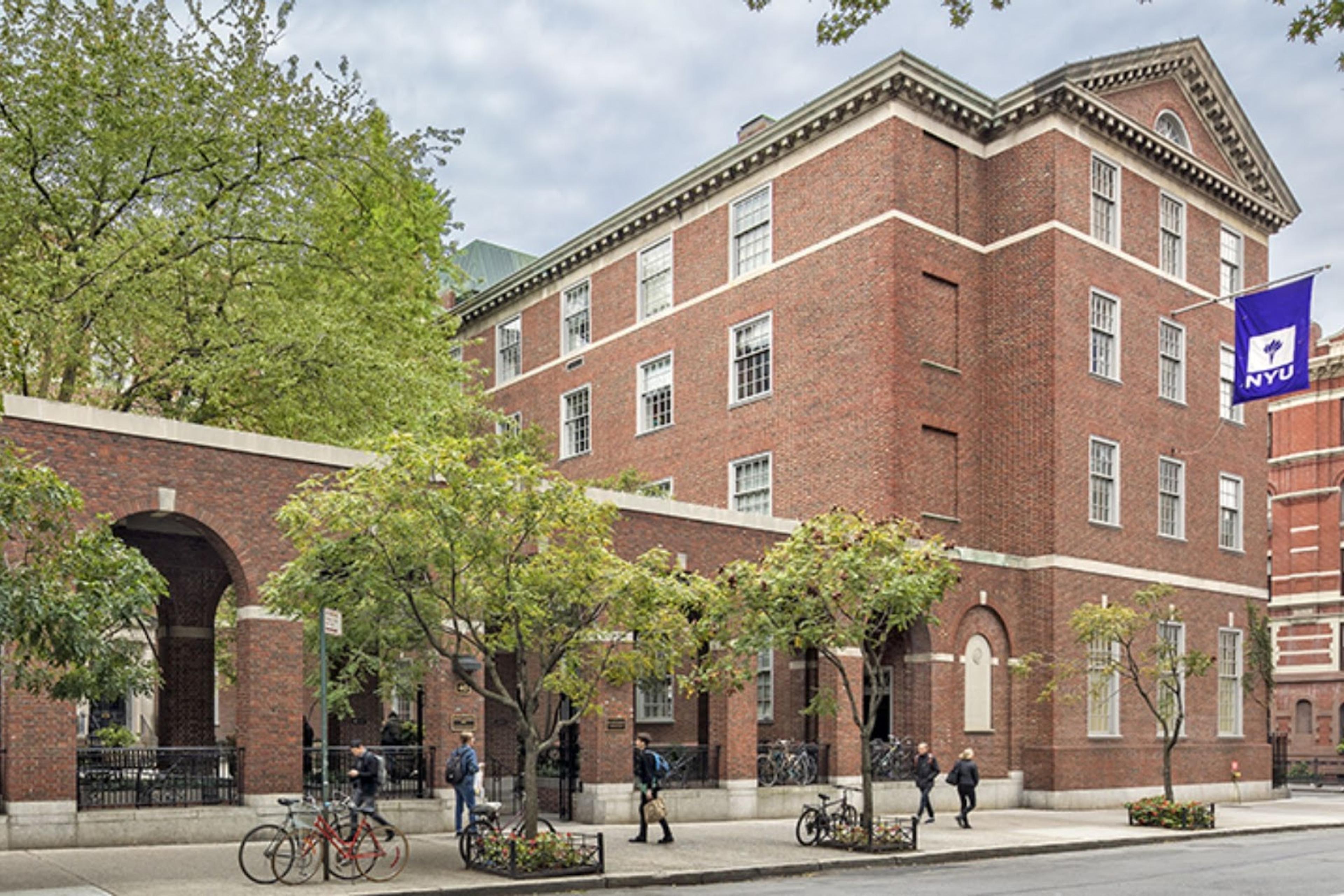NYU School of Law: A Comprehensive Overview and Guide
Looking to pursue a career in law? Our comprehensive guide to NYU School of Law provides an in-depth overview of the program, curriculum, and admissions process.
Posted June 13, 2025

Join a free event
Learn from top coaches and industry experts in live, interactive sessions you can join for free.
Table of Contents
If you're considering attending law school, NYU School of Law is undoubtedly on your radar. As one of the most prestigious law schools in the country, NYU School of Law has been churning out some of the country's top lawyers for over a century. But what sets NYU apart from other law schools, and what can you expect if you choose to attend? In this comprehensive overview and guide, we'll explore the history of NYU School of Law, the admissions process and requirements, academic programs offered, faculty and staff, student life and activities, as well as career opportunities and campus resources available to you.
History of NYU School of Law
NYU School of Law has a rich history that dates back to the early 19th century. Founded in 1835, the school's original name was the University of the City of New York Law School. At that time, the school offered a two-year program that was considered one of the best in the country. However, it wasn't until 1894 that the school changed its name to the New York University School of Law and moved to its current location in Washington Square. Since then, the school has continued to build on its reputation and is now considered one of the most prestigious law schools in the country.
Throughout its history, NYU School of Law has been at the forefront of legal education and scholarship. In the 1920s, the school established the first law and economics program in the United States, which has since become a major field of study. In the 1950s, the school was one of the first to offer a clinical legal education program, which allowed students to gain practical experience by working on real cases under the supervision of faculty members.
Today, NYU School of Law continues to innovate and adapt to the changing legal landscape. The school offers a wide range of programs and initiatives, including the Center for Human Rights and Global Justice, the Institute for International Law and Justice, and the Furman Center for Real Estate and Urban Policy. With its commitment to excellence and its dedication to social justice, NYU School of Law is poised to remain a leader in legal education for years to come.
Admissions Process and Requirements at NYU School of Law
The admissions process at NYU School of Law is highly competitive, with only around 20% of applicants being accepted. To be considered for admission, you must hold a bachelor's degree from an accredited institution, and take the Law School Admission Test (LSAT). The school places a considerable emphasis on your personal statement, as well as your past academic achievements and extracurricular activities. Additionally, NYU's admissions committee is looking for individuals who are committed to serving society in some way, whether through public service, activism, or other means.
Academic Programs Offered at NYU School of Law
NYU School of Law offers a variety of academic programs for those interested in pursuing a legal career. The school's J.D. program is its flagship offering and includes everything students need to become successful lawyers. Additionally, NYU offers several dual-degree programs that allow students to obtain a J.D. alongside another graduate degree, such as an M.B.A. or a Master's in Journalism. For those who are interested in pursuing legal scholarship, the school also offers a Ph.D. in Law. Finally, NYU School of Law offers a variety of specialized LL.M. programs in areas such as taxation, international business regulation, and international legal studies.
Faculty and Staff at NYU School of Law
NYU's faculty and staff are among the best in the country, with many of them being recognized as thought leaders in their fields. Professors at NYU School of Law are not only experts in the law, but they're also accomplished researchers who are well-respected in academic circles. You'll also have access to a variety of resources, including research librarians, career counselors, and academic advisors who can help guide you through your program.
Student Life and Activities at NYU School of Law
As a student at NYU School of Law, you'll have access to a vibrant campus community that offers a wide range of extracurricular activities and events. Alongside student-run organizations and clubs, the school's Law and Social Change Program provides opportunities to get involved in social justice issues and activism. The school also offers unique events, such as "speed-networking" with alumni and employers, and mock interview sessions to help prepare students for job interviews.
Career Opportunities for Graduates of NYU School of Law
NYU School of Law is renowned for producing excellent lawyers who have gone on to work at some of the country's top law firms and public interest organizations. In addition to its excellent job placement rates, NYU School of Law offers a variety of resources to help its graduates succeed, including a robust alumni network, job search resources, and networking events. Additionally, the school's Public Interest Law Center provides students with the opportunity to work with underserved communities and non-profit organizations, exposing them to a variety of rewarding career opportunities.
Financial Aid and Scholarships Available to Students at NYU School of Law
NYU is committed to providing financial aid to students who need it and has one of the most generous financial aid programs in the country. In addition to federal financial aid programs, the school offers a range of merit-based scholarships and grants to help alleviate the cost of attending. NYU School of Law also offers loan forgiveness and assistance programs for graduates who work in public service jobs.
Internship Opportunities for Students at NYU School of Law
NYU School of Law offers its students a wide range of opportunities to gain practical experience through internships and externships. The school's location in New York City provides ample opportunities for students to intern at some of the country's top law firms and public interest organizations, as well as various government agencies and courts. Additionally, the school's clinics and externship programs give students the chance to work on real legal cases under the supervision of experienced attorneys.
Diversity and Inclusion Initiatives at NYU School of Law
NYU is committed to promoting diversity and inclusion in all aspects of its academic and social communities. The school actively recruits and supports students from underrepresented backgrounds, and its faculty is dedicated to researching and teaching on issues related to diversity and social justice. Additionally, the school offers a variety of resources for students of different ethnic and cultural backgrounds, as well as LGBTQ+ students, and students with disabilities.
The Future Outlook for Graduates from NYU School of Law
The legal profession is constantly evolving, and NYU School of Law is committed to staying ahead of the curve. As such, the school places a considerable emphasis on incorporating emerging legal trends and technology into its curriculum. This means that graduates from NYU School of Law are well-equipped to succeed in a rapidly changing legal landscape. Additionally, the school's emphasis on public service and social justice means that its graduates are uniquely positioned to make meaningful contributions to society.
Employment Rates and Statistics for Graduates from NYU School of Law
NYU School of Law has an excellent job placement rate, with around 95% of graduates finding full-time employment shortly after graduation. Graduates from the school go on to work at some of the country's top law firms and government agencies, as well as various public interest organizations and non-profits.
Unique Features and Benefits Offered by the NYU School of law compared to other law schools
One of the things that sets NYU School of Law apart is its commitment to social justice and public service. The school's Public Interest Law Center provides students with a wide range of opportunities to work with underserved communities and non-profits, and its Law and Social Change Program helps students get involved in activism and advocacy. Additionally, the school's location in New York City offers unique opportunities for internships and externships at some of the country's top legal organizations. Finally, the school's reputation for academic excellence and its commitment to incorporating emerging legal trends and technology into its curriculum means that graduates are well-equipped to succeed in a rapidly changing legal landscape.
The role played by the location, surroundings, and campus environment in shaping the learning experience at the NYU school of law
One of the things that sets NYU School of Law apart from other law schools is its location in the heart of New York City. The city's vibrant legal community and thriving culture make it an ideal location for students who want to immerse themselves in the legal world. The school's campus is located in Greenwich Village, providing students with a unique college experience. The area is home to numerous restaurants, shops, and cultural attractions, making it an ideal location for anyone who wants to live in the city while also attending law school.
Community outreach programs offered by the school to benefit society and provide students with practical experience.
NYU School of Law is committed to serving society in a variety of ways, including through its community outreach programs. The school's Public Interest Law Center provides students with opportunities to work with underserved communities and non-profits, and its clinics and externship programs allow students to work on real legal cases under the supervision of experienced attorneys. Additionally, NYU School of Law offers a variety of public service fellowship programs that give students the chance to work with government agencies and non-profits, providing them with valuable practical experience in their chosen field.
Student engagement with alumni networks to leverage opportunities even after graduation from the law school.
NYU School of Law's alumni network is one of the most extensive and well-connected in the country, providing graduates with valuable connections and resources throughout their careers. As a student at NYU School of Law, you'll have the opportunity to engage with alumni through various networking events and mentoring programs. Additionally, the school's Office of Career Services provides students with access to alumni job search databases, as well as job fairs and recruiting events.
A comparison between the tuition fees charged at the school versus its peers within the legal education industry
Attending NYU School of Law is undoubtedly going to come with a hefty price tag. As of 2021, annual tuition for J.D. students is over $70,000, and that's before factoring in additional expenses like living costs and textbooks. However, it's worth noting that NYU School of Law is part of a relatively small group of law schools that are considered "T14" schools - that is, law schools that are consistently ranked in the top 14 law schools in the country. While tuition costs may be higher than some other law schools, attending a T14 school can pay off in terms of job opportunities, earning potential, and prestige.
Conclusion
Attending NYU School of Law is undoubtedly a challenging and rewarding experience. From its prestigious faculty to its vibrant campus community and excellent job placement rates, NYU School of Law has everything you need to succeed in your legal career. While the school is undoubtedly expensive, its reputation and dedication to promoting social justice and public service make it well worth the investment for anyone who wants to make a positive impact in their chosen field.
Browse hundreds of expert coaches
Leland coaches have helped thousands of people achieve their goals. A dedicated mentor can make all the difference.


















